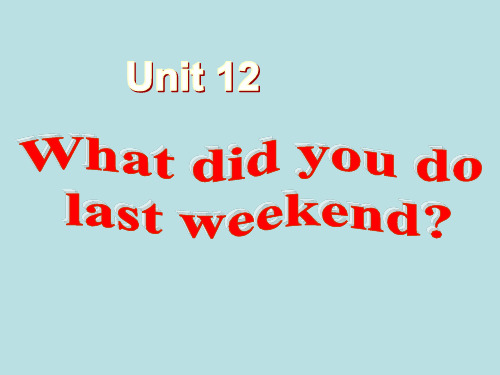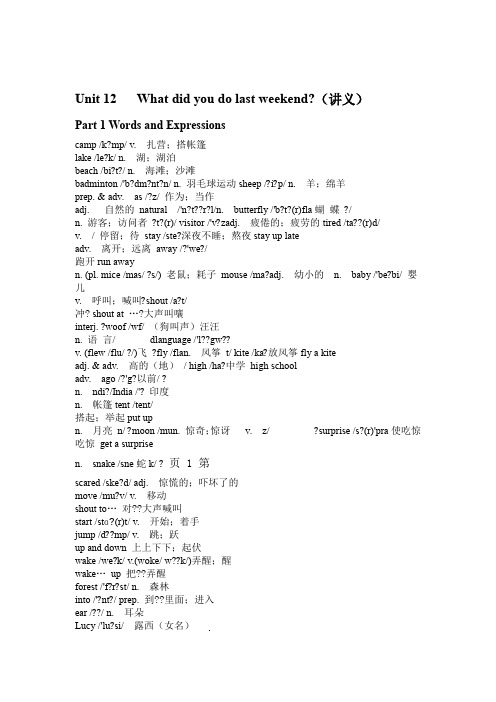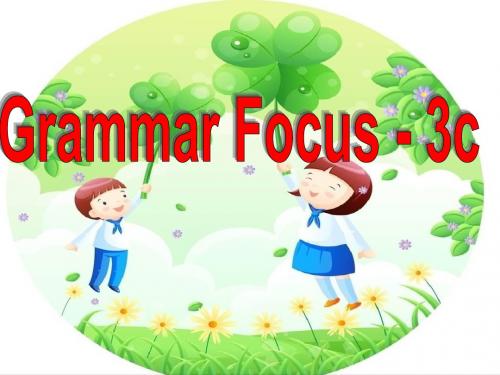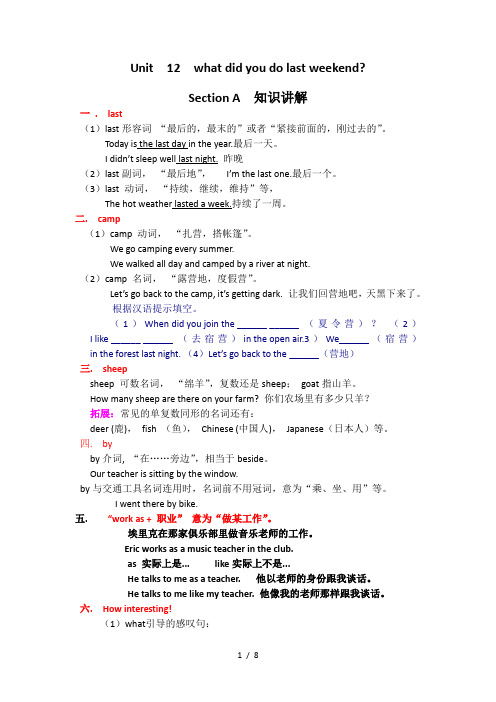Unit 12 What did you do last weekend
- 格式:doc
- 大小:742.50 KB
- 文档页数:11

Unit 12 What did you do last weekend?知识强化一、知识概述1.学习和掌握本单元出现的生单词、词组和句型。
2.继续学习和巩固动词的一般过去时用法。
3.学习一般过去时的特殊疑问句用法。
二、语音知识:Listen and read. Notice the change in the past forms.三、单元重难点解析1.词汇篇:do my homework——went to the cinemago boating——camped by the lakego to the beach——played badmintonsing and play the guitar——went to the libraryswim in a swimming pool——studied for a testhave dinner with friends——flew a kitesit under the moon——told each other storiesgo to sleep—2.What did you do last weekend, Lucy?露西,上周末你做了什么?这个句子是谓语动词是实义动词的一般过去时的特殊疑问句用法。
特殊疑问词+did+主语+动词原形+其它?e.g.What did you do last night?昨天晚上你做了什么?Where did he go last Sunday?上个星期天他去哪儿了?Who did she go with?她和谁一起去的?注意:(1)当特殊疑问词是充当主语时,则不需要使用助动词did,直接用特殊疑问词加动词的过去式来表达就可以了。
e.g.Who visited her grandma?谁拜访了她的奶奶?(2)当句子的谓语动词是be动词was/were时,特殊疑问句的结构为“特殊疑问词+ was/were +其它?”e.g.How was your weekend?你周末过得如何?How was the weather in Beijing?那时候北京天气如何?3.How interesting! [译文]多么有趣啊!这是个感叹句。


Unit 12 What did you do last weekend?(讲义)Part 1 Words and Expressionscamp /k?mp/ v. 扎营;搭帐篷lake /le?k/ n. 湖;湖泊beach /bi?t?/ n. 海滩;沙滩badminton /'b?dm?nt?n/ n. 羽毛球运动sheep /?i?p/ n. 羊;绵羊prep. & adv. as /?z/ 作为;当作adj. 自然的natural /'n?t??r?l/n. butterfly /'b?t?(r)fla蝴蝶?/n. 游客;访问者?t?(r)/ visitor /'v?zadj. 疲倦的;疲劳的tired /ta??(r)d/v. / 停留;待stay /ste?深夜不睡;熬夜stay up lateadv. 离开;远离away /?'we?/跑开run awayn. (pl. mice /mas/ ?s/) 老鼠;耗子mouse /ma?adj. 幼小的n. baby /'be?bi/ 婴儿v. 呼叫;喊叫?shout /a?t/冲? shout at …?大声叫嚷interj. ?woof /wf/ (狗叫声)汪汪n. 语言/ dlanguage /'l??gw??v. (flew /flu/ ?/)飞?fly /flan. 风筝t/ kite /ka?放风筝fly a kiteadj. & adv. 高的(地)/ high /ha?中学high schooladv. ago /?'g?以前/ ?n. ndi?/India /'?印度n. 帐篷tent /tent/搭起;举起put upn. 月亮n/ ?moon /mun. 惊奇;惊讶v. z/ ?surprise /s?(r)'pra使吃惊吃惊get a surprisen. snake /sne蛇k/ ?页 1 第scared /ske?d/ adj. 惊慌的;吓坏了的move /mu?v/ v. 移动shout to…对??大声喊叫start /stɑ?(r)t/ v. 开始;着手jump /d??mp/ v. 跳;跃up and down 上上下下;起伏wake /we?k/ v.(woke/ w??k/)弄醒;醒wake…up 把??弄醒forest /'f?r?st/ n. 森林into /'?nt?/ prep. 到??里面;进入ear /??/ n. 耳朵Lucy /'lu?si/ 露西(女名)wake v.(woke/ w??k/)弄醒;醒wake…up 把??弄醒The shouting waked up Jim.The shouting waked Jim up.Please wake me up at five.wake…up 名词作其宾语,放在或均可,。


Unit 12 what did you do last weekend?Section A 知识讲解一. last(1)last形容词“最后的,最末的”或者“紧接前面的,刚过去的”。
Today is the last day in the year.最后一天。
I didn’t sleep well last night. 昨晚(2)last副词,“最后地”,I’m the last one.最后一个。
(3)last 动词,“持续,继续,维持”等,The hot weather lasted a week.持续了一周。
二. camp(1)camp 动词,“扎营,搭帐篷”。
We go camping every summer.We walked all day and camped by a river at night.(2)camp 名词,“露营地,度假营”。
Let’s go back to the camp, it’s getting dark. 让我们回营地吧,天黑下来了。
根据汉语提示填空。
(1)When did you join the ______ ______ (夏令营)?(2)I like ______ ______ (去宿营)in the open air.3)We______(宿营)in the forest last night. (4)Let’s go back to the ______(营地)三. sheepsheep 可数名词,“绵羊”,复数还是sheep;goat指山羊。
How many sheep are there on your farm? 你们农场里有多少只羊?拓展:常见的单复数同形的名词还有:deer (鹿),fish (鱼),Chinese (中国人),Japanese(日本人)等。
四. byby介词, “在……旁边”,相当于beside。
Our teacher is sitting by the window.by与交通工具名词连用时,名词前不用冠词,意为“乘、坐、用”等。

课题:Unit 12 What did you do last weekend?(1) Daily greeting to the Ss (日常问候)(2) Show the six pictures and explain the new phrases to Ss.T: Sally and Jim had a busy weekend. Look at the pictures. Can you tell me what they did?T: What did Sally do yesterday?T: What did Jim do yesterday?(Help Ss to use the other phrases in 1a to answer the questions. such as sang and played the guitar, studied for a test, had dinner with friends, went to the library.) (2)Flash the pictures on the screen as quickly as possible. Then ask Ss “What did he/she do?” Have Ss answer the question as quickly as they can.(3) Show the phrases again and help Ss change the verbs from the present tense to the simple past form.Have Ss work on 1b.T: Do you think the activities in 1a are fun? Draw a happy face or an unhappy face under each picture.Give Ss some phrases that they can use, such as zoo, school, beach, my aunt’s, mother, father, my best friend … They can use these phrases to make their conversations.。
Unit 12 What did you do last weekend(讲义及答案)Unit 12 What did you do last weekend?(讲义)Part 1 Words and Expressionscamp /kæmp/ v. 扎营;搭帐篷lake /leɪk/ n. 湖;湖泊beach /biːtʃ/ n. 海滩;沙滩badminton /'bædmɪntən/n. 羽毛球运动sheep /ʃiːp/ n. 羊;绵羊as /æz/ prep. & adv. 作为;当作natural /'nætʃərəl/adj. 自然的butterfly /'bʌtə(r)flaɪ/ n. 蝴蝶visitor /'vɪzɪtə(r)/n. 游客;访问者tired /taɪə(r)d/adj. 疲倦的;疲劳的stay /steɪ/ v. 停留;待stay up late 深夜不睡;熬夜away /ə'weɪ/ adv. 离开;远离run away 跑开mouse /maʊs/ n. (pl. mice /maɪs/) 老鼠;耗子baby /'beɪbi/ adj. 幼小的n. 婴儿shout /ʃaʊt/ v. 呼叫;喊叫shout at …冲……大声叫嚷woof /wʊf/ interj. (狗叫声)汪汪language /'læŋgwɪdʒ/ n. 语言fly /flaɪ/ v. (flew /fluː/)飞kite /kaɪt/ n. 风筝fly a kite 放风筝high /haɪ/ adj. & adv. 高的(地)high school 中学ago /ə'gəʊ/ adv. 以前India /'ɪndiə/n. 印度tent /tent/ n. 帐篷put up 搭起;举起moon /muːn/ n. 月亮surprise /sə(r)'praɪz/ n. 惊奇;惊讶v. 使吃惊get a surprise 吃惊snake /sneɪk/ n. 蛇开始做某事surprise n. 惊奇;惊讶v. 使吃惊You didn’t know my surprise when I he ard that news.My sister and I got a terrible surprise yesterday.get a surprise 吃惊Jimmy’s words surprised me a lot.It surprised us to see Jane get up soearly. surprise sb. 使……吃惊n. 意想不到的事;惊喜It’s a lovely surprise to see youagain. I have a little surprise foryou.shout v. 呼叫;喊叫There’s no need to shout. I am notdeaf! We could hear them shoutingfor help. shout at…s hout to…The bus driver is shouting at the oldman. Don’t shout at me. I don’t likethat.I had to shout to Tom because he was so far from me.My mother shouted to me on the other side of the road, but I still couldn’t hear her w ords.shout at…对……叫嚷,多指因shout to…对……喊,多指因Part 2 Role-playRole-play the conversation.Paul: Hi, Lisa. How was yourweekend? Lisa: Great, thanks.Paul: What did you do?Lisa: I worked as a guide at the Natural HistoryMuseum. Paul: Really? How interesting!Lisa: Yeah, it was fun. They have butterfly house with over 200 kinds of butterflies! I told the visitors about themand their living habits. Did you have a good weekend? Paul: Yeah, it was good, but I’m kind of tired now. I stayed up late to watch the soccer game.How interesting!Look at the bird. How beautiful!I had a terrible weekend. How tired!Five hours ago we left Beijing on this train, but now we’re arriving in Shanghai! How fast!I got on the bus one hour ago. How slowly!how 引导感叹句,译为“多么……;真……”,后面接或。
Unit 12What did you do last weekend?Section A 1 (1a-2d)一、教学目标:1. 语言知识目标:1)掌握以下单词:camp, lake, beach, badminton, sheep, as, natural, butterfly, visitor, tired, stay, stay up late.能掌握以下句型:①—Where did you do last weekend, Lucy?—I went to summer camp.②—How was your weekend?—Pretty good,thanks③—I worked as a guide at the Natural History Museum.④How interesting!2) 能了解以下语法:learn to talk about recent past events.2. 情感态度价值观目标1.帮助学生树立合作学习观点。
2.讲述美好的周末,树立学生享受生活,热爱美好的大自然情感。
二、教学重难点1. 教学重点:1) Key vocabulary.2) Talk about recent past events2. 教学难点:1) Talk about recent past events2) Practice students’ listening, speaking, reading and writing skills.三、教学过程Ⅰ. Warming-up and revisionPoint to the previous Saturday and Sunday on a wall calendar and say, Saturday and Sunday are the weekend. This is last weekend. Then tell some things you did last weekend such as cleaned my house over the weekend. Use quick sketches (in theboard along with gestures to demonstrate the meaning of each activity,Ⅱ.1 a This activity introduces the key vocabulary.Focus attention on the picture. Ask students to tell what they see. Name each activity and ask students to repeat:did my homework, went to the cinema, went boating, camped by the lake, went to the beach,played badminton.Point out the numbered list of activities. Say each one again and ask students to repeat.Then ask students to match each activity with one of the pictures. Say, Write the letter of each activity next to the words. Point out the sample answer.Check the answers.Ⅲ. ListeningWork on 1bThis activity gives students practice in understanding the target language in spoken conversation.Point to the activities in the picture in activity la. Ask students to tell what the person did in each picture. For example, she played badminton, or Lucy went to the cinema. Play the recording the first time. Students only listen.Play the recording a second time. This time say. Listen to the recording and write the days and times Lucy did each thing under the pictures. Point out the sample answer under the picture of Lucy playing badminton; on Saturday morning.Correct the answers.Ⅳ. PairworkWork on 1cThis activity provides guided oral practice using the target language.Point to the example conversation. Ask two students to read the dialogue to the class.Say, now work with a partner. Student A, pretend to be Lucy. Student B, ask questions about what Lucy did on different days and times over the weekend.Talk about the activities in the picture.Students work in pairs. As they talk, move around the room monitoring their work.Offer language or pronunciation support as needed,Ⅴ. ListeningWork on 2a:This activity gives students practice in understanding the key vocabulary in spoken conversation.Point to the five sentences and ask a student to read these sentences to the class.Say, You will hear recording of a conversation. The people will talk about some of the activities and people, but they will not talk about others. Please underline the words you hear on the recording.Play the recording the first time. Students only listen.Play the recording a second time. This time, ask students to underline each word that is said on the tape. Point out the sample answer, grandmother.Correct the answers.1grandma 2 homework 3 English 4 farm 5 cowsⅥ. ListeningWork on 2b:This activity provides listening practice using the target language.Call attention to the pictures of Carol, Becky, and Jack and ask students to identify each person by name.Say, Now I will play the recording again. Listen to the students talking about what they did over the weekend. Write C for Carol, B for B Becky or J for Jack next to each statement in activity 2a. The first one has been done for you.Play the recording the first time. Students only listen.Point out the sample answer, S, in statement 1. Say, Sonia visited her grandmother.Play the recording again. Ask students to write a letter in front of each statement to show what each person did.Check the answers. B B C J JⅦ. Pair workAsk and answer in pairs.Point to the example conversation. Ask two students to read the dialogue to the class.Say, Now work with a partner. Student A, ask questions about what,who or where, Student B answers. Students work in pairs.Ⅷ.Role-play the conversation.1. Ask Ss to look at conversation in 2d. Then Ss read the dialogue by themselves andfind the answer to these questions:① What did Lisa do on her weekend?② What did Paul do on his weekend?2. Ss work in pairs and role-play the conversations.3. Have several pairs perform their conversations for the rest of the class.Homework:1. Copy new words twice.2. Write about what you did last weekend.板书设计:Section A 2 (Grammar Focus-3c)一、教学目标:1. 语言知识目标:1) 掌握以下单词:away, mouse, baby, shout ,shout at, woof, language.2) 继续练习一般过去时态能掌握以下句型:—What did you do last weekend?—I did my homework.—Who visited her grandma?—Becky did.—Where did she go last weekend?—She went to a farm.—Who did she go with?—She went with her classmates.2. 情感态度价值观目标:1.提高学生独立学习能力。
七年级英语下册Unit12Whatdidyoudolastweekend知识点七年级英语下册Unit12Whatdidyoudolastweekend知识点一.短语归纳1.domyhomework做作业2.gotothecinema去看电影3.goboating去划船4.bythelake在湖边5.gotothebeach去海滩6.playbadminton打羽毛球7.visitmygrandma看望我奶奶8.studyfortheEnglishtest为英语测验而学习备考9.theNaturalHistoryMuseum自然历史博物馆10.kindsof各种各样的11.livinghabits生活习惯12.stayup深夜不睡,熬夜13.giveback归还14.playtheguitar弹吉他15.gotothelibrary去图书馆16.inaswimmingpool在游泳池里17.shoutat…冲……大声叫嚷18.highschool高中,中学19.flykites放风筝、20.gocamping去野营21.putup搭建22.makeafire生火23.tellstories讲故事24.eachother互相25.gotosleep入睡26.getasurprise吃惊27.shoutto…呼喊……喊叫……28.upanddown来来回回;上上下下29.wake…up把……弄醒31.onSaturdaymorning在星期六早上32.haveagoodweekend周末过得愉快33.thenextmorning第二天早上34..runaway跑开35.moveinto…移进…二.用法集萃1.go+doing去做某事2.play+球类玩……球3.时间段+ago……前 4.keep+sb./sth.+形容词/副词/介词短语使……保持……5.so+形容词/副词+that句子如此……以至于……6.seesb.doingsth.看见某人正在做某事7.letsb.dosth.让某人做某事8.starttodo/doingsth.开始做某事三.重点句型1.—Whatdidyoudolastweekend?—Ididmyhomework.—上个周末你做了什么了?—我做我的家庭作业了。
Unit 12 What did you do last weekend?词汇精讲1. last(1)last 作形容词时,意为“最后的,最末的”或者“紧接前面的,刚过去的”。
例如:Today is the last day in the year. 今天是今年的最后一天。
I didn’t sleep well last night. 昨晚我没睡好。
(2)last作副词时,意为“最后地”,例如:I’m the last one. 我是最后一个。
(3)last 做动词时,意思是“持续,继续,维持”等,例如:The hot weather lasted a week. 炎热的天气持续了一周。
2. as(1)as作介词时意为“作为”,其后多接表示职业、职务、用途、作用之类的名词。
例如:He works as a worker. 他作为一名工人而工作。
I used one of my shoes as a hammer. 我拿我的一只鞋当锤子使。
(2)as还可以作连词,其后多接从句或介词短语。
例如:All the six students do as the teacher says. 所有这六个学生都按照老师说的做。
3. camp(1)camp 作动词,意为“扎营,搭帐篷”。
例如:We go camping every summer. 我们每年夏天都去野营。
We walked all day and camped by a river at night.我们走了一天,晚上在一条河边宿营。
(2)camp 作名词,意为“露营地,度假营”。
例如:Let’s go back to the camp, it’s getting dark. 让我们回营地吧,天黑下来了。
We spent two weeks at camp this summer. 我们今年夏天在度假营玩了两周。
4. sheepsheep 可数名词,意为“绵羊”,它的复数还是sheep;而goat侧重指山羊。
Unit 12 What did you do last weekend?单元测试I. 听力部分一、听句子,根据所听内容选择相应的图片。
A B C D E1._______ 2._______ 3._______ 4._______ 5._______ 二、听对话,根据所听内容判断句子正(T)误(F)。
( ) 1.The girl had a great weekend.( ) 2.She did her homework on Saturday morning.( ) 3.She played badminton with her sister on Saturday afternoon.( ) 4.She went to a movie on Saturday evening.( ) 5.On Sunday her family went to a mountain, but they didn’t climb to the top. 三、听短文,根据所听内容选择正确答案。
( ) 1.Does Tom love animals?A. Yes, he does.B. No, he doesn’t.C. We don’t know.( ) 2.What did Tom do with the bird?A. He took it home.B. He ate it.C. He killed it.( ) 3.Why couldn’t the bird fly?A. Because it was too small.B. Because its leg was broken.C. Because it was dead(死的).( ) 4.How long did it take the bird to get well?A. Two days.B. Three days.C. Four days.( ) 5.How did Tom feel when the bird flew up into the sky?A. Angry.B. Sad.C. Happy.II. 基础知识一、根据首字母提示和句子意思补全单词,完成句子。
1.The cat caught a m________ in the kitchen.2.She was s________ of the dark when she was young.3.Tony’s little sister is just one year old. Exactly, she’s a b________.4.The water in the l________ is so clear(清澈的).5.I saw lots of s________ and cows on the farm. They were eating grass.二、单项选择。
( ) 1.________ Sunday morning, I drove to the countryside with my best friend.A. OnB. AtC. InD. For( ) 2.— ________ did you go to the cinema with yesterday?— I went with my mother.A. HowB. WhoC. WhereD. When( ) 3.— I want to visit Mr. Brown this afternoon.— He’s not at home. He ________ to his son’s city two days ago.A. goB. goesC. wentD. will go( ) 4.Li Hua was so angry. She shouted ________ her brother. Because he broke her favorite model plane.A. atB. toC. forD. with( ) 5.— Who cleaned the kitchen?— Jack ________.A. doB. doesC. didD. was( ) 6.Tom usually ________ to library on weekends. But last weekend he ________ for a test at home.A. goes; studiesB. goes; studiedC. went; studiedD. went; studies( ) 7.— Don’t ________ late, David. You have to go to school tomorrow.— Sorry, Dad. I will go to sleep right now.A. stay upB. get upC. run awayD. put up( ) 8.After speaking for three hours, he was so ________ and didn’t want to say any words.A. interestedB. excitedC. happyD. tired( ) 9.My mom ________ so early this morning. I am sleepy now.A. wakes me upB. wake me upC. woke me upD. woke up( ) 10.— ________, someone is crying.— Sorry. I can ________ nothing.A. Listen; listenB. Hear; listenC. Listen; hearD. Hear; hear三、翻译下列句子。
1.昨天我在公园里放风筝。
I ________ ________ ________ in the park yesterday.2.三年前,他在一所中学任教。
He ________ a teacher in a ________ ________ three years ago.3.上周末我和我的同学们打羽毛球了。
________ ________ I ________ badminton ________ my classmates.4.老虎听到声音,跑到森林里去了。
The tiger heard the sound and ________ ________ the ________.5.上周六,我们在湖边扎营,享受免费的阳光。
Last Saturday, we ________ ________ the lake and ________ free sunshine.III. 交际运用从方框中选择适当的句子补全对话,其中有一个多余选项。
Martin went to the beach at the weekend. Now he’s talking to his friend David about it. David: How was your weekend, Martin?Martin: It was great. (1)________ We had a wonderful time there.David: Sounds nice. What did you do there?Martin: We got up early in the morning and walked on the beach. (2)________David: Was it beautiful?Martin: Yes, it’s always beautiful. If you looked around, you could only see blue sky, blue water and green trees.David: (3)________Martin: Yes, we did. We went swimming in the afternoon. My dad liked surfing best. My mom liked to sit on the beach and read books. And I played in the sand with someother boys.David: (4)________Martin: Yes, we did. I took many photos of the sea and the islands, and my dad took a lot of pictures of me!David: (5)________Martin: Sure! Here you are.David: Wow! How beautiful!A. We watched the sun rising over the sea.B. Did you go swimming?C. I went to the beach with my parents.D. Can I have a look at your photos?E. Did you have a good time?F. Did you take any photos?IV. 短文填空阅读下面的短文,用方框中所给单词的适当形式填空。
leave get take be arrivestart go tell come bringLast weekend our head teacher, Mr. Green,(1)__________us to Greentown on a school trip. We (2)__________ home at 7:00 a.m. on Saturday morning. The trip took many hours! Some of us fell asleep(睡着的) on the way because we (3)__________ up very early in the morning. Wefinally (4)__________ in Greentown at 11:30 a.m. Then it (5)__________ to rain heavily.After lunch, we (6)__________ to a national park. However, we didn’t have much to do because of the rain.Sunday afternoon was terrible, too. Two girls went to the center of the town and didn’t (7)__________ Mr. Green. They could not find the way back. A policeman (8)__________ them back to our hotel. Mr. Green was very angry(生气的).We (9)__________ back to our city on Sunday evening. We (10)__________ cold, wet and tired. Never again.V. 阅读理解阅读下面的电子邮件,根据所读内容选择最佳答案。